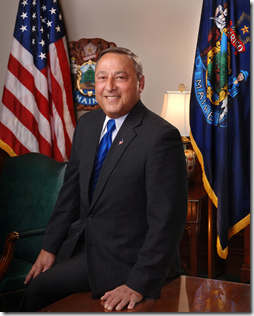Dear Governor: Blacklisting The Media Is A Bad Idea
Paul LePage, the controversial Republican governor of Maine, has a long history of contentious relations with the press. But the negative coverage his top environmental regulator received in a few local newspapers recently sent him over the edge.
According to the Portland Press Herald, LePage announced through a spokesperson on Tuesday that his administration “will no longer comment on stories published by the Portland Press Herald, the Kennebec Journal and the Morning Sentinel.” In other words, he’s blacklisting three of his state’s newspapers.
He may think he’s punishing them. But he’s the one who’s likely to pay the price.
Let’s put this in context. When Governor LePage won the gubernatorial race in 2010 (a race that he barely won), a total of 565,542 Maine residents cast votes. The three newspapers LePage just blacklisted have a combined paid Sunday circulation of more than 100,000—which translates to many more readers. That’s an awful lot of people Governor LePage is opting not to communicate with directly anymore.
In The Media Training Bible, I describe “The Rule of Thirds,” which makes clear why the Governor’s decision is a bad one. There are three voices in many news stories—yours, your opponent’s, and the reporter’s. If you refuse interviews about which you’re the subject, “The Rule of Thirds” states that you’ll likely go 0-for-3 in the story.
1/3 — Your Opponent’s Voice
1/3 — The Reporter’s Voice
1/3 — Your Voice
That’s because your opponent will almost surely be critical of you in their one-third of the story, and reporters may hold your refusal to comment against you by slanting the tone of their one-third in favor of your opponent.
Speaking to the reporter doesn’t guarantee you a positive story, as the LePage Administration already knows. But it’s still usually worth agreeing to the interview since going 1-for-3 is a whole lot better than not scoring at all. Plus, his participation in the story would make clear to the public that he’s not in “duck and cover” mode.
Instead of blacklisting a news organization—which should always be a rare last resort—his administration should at the very least comment on stories by providing a short, written statement to the three papers. That prevents the reporters from saying LePage refused to comment (which looks obstructionist), and gives him at least some control over his own point of view. If he sends just a line or two, the papers will likely be forced to print them verbatim.
And that’s a whole lot better than striking out.
What do you think? Is Governor LePage right to blacklist these news organizations, or is he just hurting himself? Please leave your thoughts in the comments section below.
A grateful tip o’ the hat to reader Steve Weitzman. Paul LePage photo by Jim Bowdoin.




Dumb, dumb, dumb.
If the Governor wanted to find an example of how ineffective (and even incendiary) his policy can be, he can look north of the border where Toronto Mayor Rob Ford has blacklisted one of the country’s largest papers (The Star).
Now, the Governor may never be accused of smoking crack, but there’s no doubt that the Mayor’s unwillingness to release even the most basic of information (his agenda for example) has created a vacuum which his most ardent critics and opponents have only been too happy to fill. In some ways being shut out has also made The Star that much more dogged in it’s approach for information about Mr. Ford and his administration.
The more the Mayor allowed stories in The Star to go unchallenged, the more the narrative that he was “not up to the task of being a big city Mayor” was allowed to develop and cement into the minds of a large portion of the public.
It’s the old “death by a thousand cuts” scenario. Hopefully the Gov. will reconsider.
Thanks for another thought provoking post!
Brett
Great comment, Brett, and you’re right – why would you give your opponents even more ammunition against you?
I know it’s tempting to blacklist an unfavorable news organization when you’re under attack. But doing so ignores that you’re voluntarily surrendering your ability to communicate with the news organization’s audience directly.
Thank for reading,
Brad